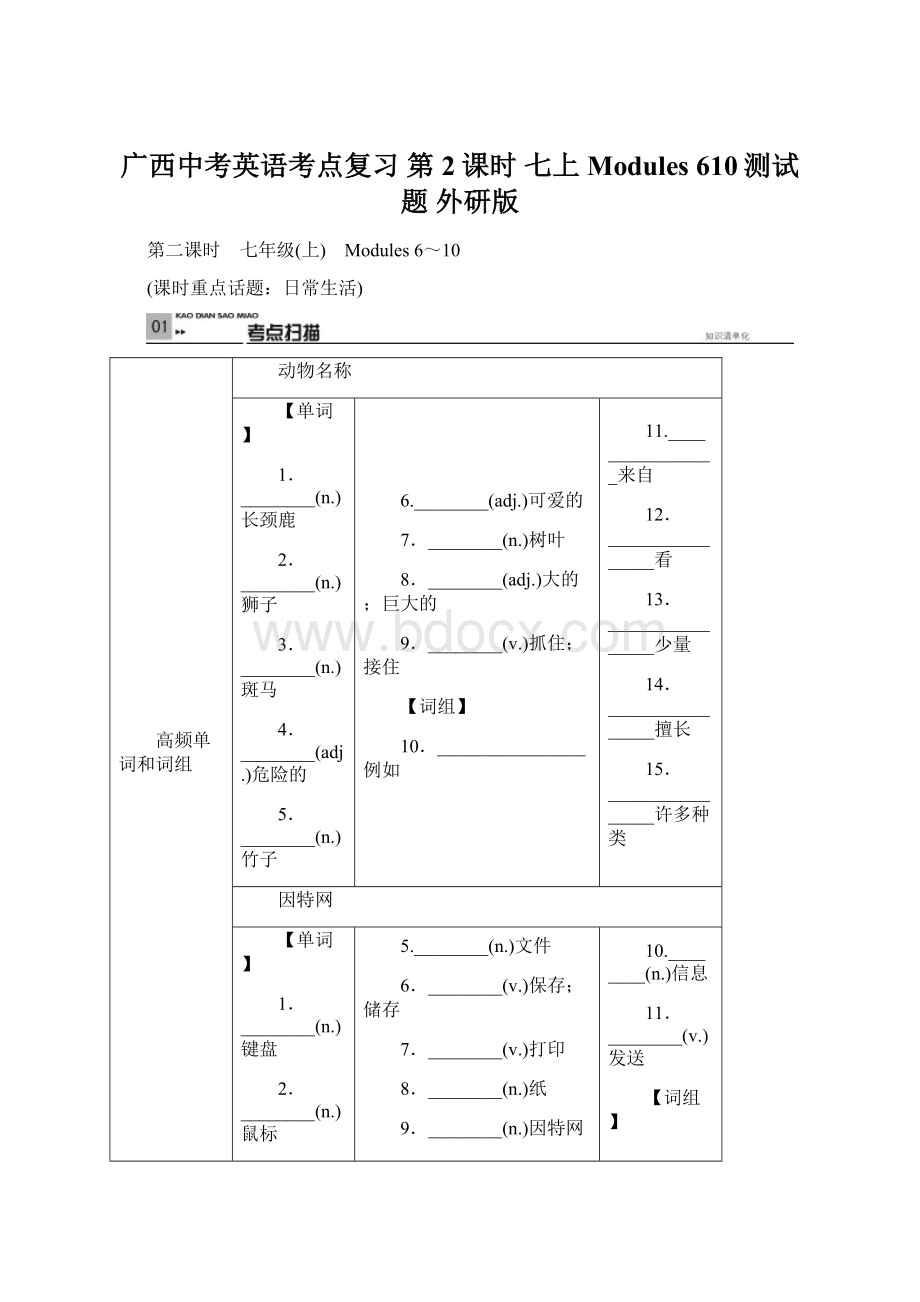广西中考英语考点复习 第2课时 七上 Modules 610测试题 外研版Word下载.docx
《广西中考英语考点复习 第2课时 七上 Modules 610测试题 外研版Word下载.docx》由会员分享,可在线阅读,更多相关《广西中考英语考点复习 第2课时 七上 Modules 610测试题 外研版Word下载.docx(20页珍藏版)》请在冰豆网上搜索。

13.________________搜寻;
查找
习俗和节假日
1.________(n.)卡片
2.________(n.)礼物
3.________(adj.)特别的;
特殊的
4.________(n.)秘密
5.________(v.)花费
6.________(n.)明信片
7.________(n.)旅行
8.________(v.)享受
9.________(n.)餐馆
10.________(n.)灯笼
11.________(n.)节日
12.________(adj.)美丽的
13.________
(n.)圣诞节
14.________(n.)二月
15.________(v.)庆祝
16.________(n.)饺子
17._____
___________在周末
18.__
______________收到……的来信
19.________________拍照
20.________________等待
21.________________回去
22.________________下(飞机,火车等)
23.________________为……做好准备
24.________________在工作
25.________________收起;
收拾好
26.________________扫去
其他
1.________(n.)导游
2.________(adj.)不同的
3.________(n.)国家
4._______(adv.)的确;
当然
5.________(adv.)通常
6.________(n.)音乐会
7.________(n.)杂志
8.________(v.)选择
9.________(adj.)昂贵的
10.________(v.)发生
11.________(v.)意思是
12.________________在那边
13._____________并且;
也
14._____________全世界
15.____________一些;
几个
16.____________正在出售
17.____________赶快
词汇拓展
1.different→(不同点;
差异)________→(反义词)________
2.dangerous→(危险)________
3.them→(主格)________→(形容词性物主代词)________→(名词性物主代词)________
4.funny→(乐趣)________
5.Europe→(欧洲的;
欧洲人)________
6.Australia→(澳大利亚的;
澳大利亚人)________
7.Asia→(亚洲的;
亚洲人)________
8.Africa→(非洲的;
非洲人)________
9.leaf→(复数)________
10.use→(用途)________→(有用的)________
11.finally→(最后的,最终的)________
12.music→(音乐的)________→(音乐家)________
13.visit→(参观者;
游客)________
14.cut→(过去式/过去分词)________→(现在分词)________
15.sing→(歌手)________→(过去式)________→(过去分词)_______
16.happy→(快乐地)________→(快乐)________
17.scarf→(复数)________
18.lie躺→(现在分词)________→(过去式)________→(过去分词)________
19.sale→(动词)________
20.run→(跑步者)________→(现在分词)________→(过去式)________→(过去分词)________
21.speak→(演讲者)________→(演讲;
发言)________→(过去式)________→(过去分词)________
22.luck→(形容词形式)________→(副词形式)________
23.traditonal→(名词形式)________→(副词形式)________
24.mean→(含义;
意义)________
重点句型
1.________________BeijingZoo.欢迎来到北京动物园。
2.They________________manydifferentcountriesandtheyeat________________.他们来自不同的国家吃不同的食物。
3.—________________goandseethem?
我们去看他们好吗?
—Yes,let'
sgo.好的,我们走吧。
4.________________Iwritemyhomeworkonthecomputer?
我如何在电脑上做家庭作业?
5.OntheInternet,I________________information,domyhomeworkand________myemail.在因特网上,我搜索信息,做家庭作业和查看邮件。
6.Youcan________sendemails________speaktofriends.你也可以发邮件或者和朋友谈话。
7.—Hi,________you________tocometomybirthdayparty?
你好,你想参加我的生日聚会吗?
—Yes,________________to.是的,我很乐意。
8.________doyou________________ataChinesebirthdayparty?
在中国的生日聚会上你们通常做什么?
9.I'
m________ontheGreatWallofChinaand________toyou.我正站在中国的长城上和你讲话。
10.________________theothers?
其余的怎么样?
11.________you________yourpostcardfromtheGreatWall.谢谢你从长城给我发来明信片。
核心语法
1.行为动词的一般现在时
2.频度副词
3.现在进行时
Ⅰ.听对话及问题,选择正确的答案。
( )1.A.Anna'
smotherplayssportseveryday.
B.Anna'
smotherwatchessportsonthecomputer.
C.Anna'
smotherwatchessportsonTV.
( )2.A.ShethinkswatchingTVisrel
axing.
B.ShethinkswatchingTVisboring.
C.Shedoesn'
twatchTV.
( )3.A.October10th. B.October11th.C.October12th.
( )4.A.Apples. B.Carrotsandeggs.C.Applesandeggs.
( )5.A.Toplayvolleyball. B.Toplaysoccer.C.Toplaycomputergames.
Ⅱ.听短文,选择正确的答案。
( )6.WhendoesTony'
sschoolhaveclasses?
A.Ateighto'
clock.B.Atseveno'
clock.C.Atnineo'
clock.
( )7.DoesTonyhaveclassesonTuesdayafternoon?
A.Yes,hedoes. B.No,hedoesn'
t.C.Wedon'
tknow.
( )8.HowmanyEnglishclassesdoesTonyhaveeveryweek?
A.Three.B.Four.C.Five.
( )9.WhatdoesTonythinkofEnglish?
A.It'
sdifficult. B.It'
sboring.C.It'
srelaxing.
( )10.WhatsubjectsdoesTonylike?
A.EnglishandP.E. B.Mathandart.C.P.E.andart.
❶—Shall__wegoands
eethem?
sgo.
——我们去看他们好吗?
——好的,我们走吧。
Ⅰ.单项选择。
( )1.(2015·
南宁模拟)—Wouldyouliketojoinus?
—________
A.Yes,Ido.B.Yes,I'
dloveto.C.Yes,Ican.D.Yes,Iam.
( )2.(2015·
来宾)—It'
ssunnytoday.Howaboutgoingfishing?
—________!
A.Soundsgre
atB.ThankyouC.NevermindD.Don'
tworry
( )3.(2015·
雅安)Let'
s_______
_andhelphim.
A.goB.goingC.togoD.goes
Ⅱ.用括号内所给单词的适当形式填空。
4.—Wouldyoumindmy________(use)yourcomputer?
—Ofcoursenot.
5.Whynot________(ask)yourfriendsforhelpwhenyouareintrouble?
6.—Whatshallwedoafterfinishingourhomework?
—Howabout________(listen)tomusic?
▶
Shallwe/Idosth.?
意为“我们/我做……好吗?
”Let'
sdosth.意为“咱们做……吧!
”用于征求意见或建议。
“征求对方的看法或意见”的其他句型:
(1)Whynot/Whydon'
tyoudosth.?
你为什么不做……?
(2)What/Howaboutdoingsth.?
做……怎么样?
(3)Wouldyoulikesth./todosth.?
你想(做)某事(物)吗?
(4)Wouldyouminddoingsth.?
做……你介意吗?
(5)You'
dbetter(not)dosth.你最好(别)做……
❷Thepandaeatsabout30__kilos__ofbambooadayaswellasotherplants.
除了其他的植物,大熊猫一天还要吃30公斤左右的竹子。
柳江二模)—Goodmorning,madam.CanIhelpyou?
—Sure,I'
dlike________forcookingvegetables.
A.onebowlofdumplingsB.threepiecesofbreadC.fivekilosofoil
梧州)—Wouldyoulikesomethingtodrink?
—Yes,please.I'
dlikesome________.
A.beefB.juiceC.fishD.bread
兰州)Youpaid¥10for________thismorning.
A.4bottlemilksB.4bottlesofmilkC.4bottlesofmilksD.4milk
Ⅱ.根据汉语意思完成英语句子,每空一词。
4.(2014·
连云港)—Timefordinner,MumandDad.
—There'
reonly________________________________(两双筷子)onthetable.Weneedonemore.
5.格林先生买了两公斤西红柿。
Mr.Greenbought________________________tomatoes.
6.请给我两瓶橘子汁。
Pleasegiveme________________________orangejuice.
30kilosof意为“30公斤的……”,表示名词的量。
英语中不可数名词的量有两种表示方法:
(1)用some,much,alittle,alotof,abitof,plentyof等表示。
(2)用“a+个数/容器/度
量衡单位词+of”或“数词+个数/容器/度量衡单位词(复数)+of”表示。
此结构后面也可接可数名词的复数形式。
如:
apieceofpaper一张纸,twoglassesofwater两杯水,aboxofapples一箱苹果,apairofshoes一双鞋,fivekilosofoil五公斤油
❸—Hi,wouldyouliketocometomybirthdayparty?
—Yes,I'
dloveto.
——你好,你想参加我的生日聚会吗?
——是的,我很乐意。
贺州)—Wouldyouliketogooutfordinnerwithme?
—________,butIhavetofinishmyhomeworkfirst.
A.Yes,Ican.B.Sure,I'
dlovetoC.Sorry,Ican'
t.D.No,Icouldn'
t.
常德)Mariawouldlike________ananimaldoctor.
A.beB.beingC.tobe
黔南州)Edwould__liketostayathomethisafternoon.(同义替换)
A.wantsB.hasC.pl
anD.attempt
4.(2015·
德州改编)Wouldyoulike________(come)todinnertomorrowevening?
5.(2015·
泉州改编)Ihaveabadcold.Idon'
tfeellike________(e
at)anything.
(1)wouldlike意为“想要”,常用结构为:
①wouldlike+名词或代词,表示“具体要”某样东西。
Wouldyoulikeacup
oftea?
你想要喝杯茶吗?
②wouldliketodosth.想要做…… 如:
Iwouldliketoplaybasketballwithyou.我想和你一起打篮球。
③wouldlikesb.todosth.想要某人做…… 如:
Wewouldlikeyoutodotheworktoday.我们想让你今天就做这项工作。
(2)Wouldyoulike+todosth.?
是一个有礼貌、客气的邀请用语。
其肯定答语一般为:
Yes,I'
dliketo./Yes,I'
dloveto.是的,我愿意。
有时也可以说:
That'
sagood/greatidea!
若要对别人的邀请表示拒绝,要用下面句式:
Sorry,butIcan'
t…/I'
mafraidIcan'
t…对不起,但是我不能……/恐怕我不能……
【拓展】 feellike意为“想要……”,后接名词、代词或动词-ing形式。
❹say/tell/speak/talk
( )1.(201
5·
梧州二模)MrWhitewantsto________withmymotherafterschool.
A.tellB.speakC.talkD.say
黔南州)—Hello!
Ist
hatDave?
—Dave________.
A.tellingB.sayingC.speakingD.talking
Ⅱ.用say,speak,tell或talk的适当形式填空。
3.BillhaslivedinChinafornearlyhalfayear,buthecan________on
lyalittleChinese.
4.Youshouldn'
t________itlikethat.It'
simpolite.
5.Tomis________withhisfatherinthelivingroomnow.
6.Mygrandmotheroften________meastorybeforeIgotobed.
▶要点速记
考点
词义
固定搭配
say
说;
讲;
说道(及物动词,强调内容)
saytosb.对某人说话
speak
演讲;
发言;
说话(不及物动词,强调能力和方式);
说(及物动词,指说某种语言)
speakto同……说话
speakEnglish说英语
talk
说话;
交谈(多作不及物动词,指相互间的谈话)
talkto/with和……谈话
talkabout谈论
talkof谈到
tell
讲述;
告诉(及物动词)
tellastory讲故事
tellalie说谎
tellthetruth说实话
tellsb.sth.把某事告诉某人
tellsb.(not)todosth.告诉某人(不)做某事
❺WhatdoyouusuallydoataChinesebirthdayparty?
贵港)Lucylikesstayingathome.She________goestravelingduringholidays.
A.usuallyB.seldomC.alwaysD.often
来宾)Samis________lateforschool.Heisalwaysthefirsttocometoschool.
A.oftenB.neverC.sometimesD.usually
天津)I________rideabiketoschool.Butthismorning,Iwalkedtoschool.
A.neverB.hardlyC.seldomD.usually
( )4.(2015·
重庆)Icould________hearwhatyousaidjustnow.Couldyoupleasesayitagain?
A.sometimesB.alwaysC.hardlyD.clearly
Ⅱ.按要求完成下列句子,每空一词。
5.Mysisternevergoestoschoollate,________________?
(完成反意疑问句)?
6.Theboyoftengoestotheoldpeople'
shousetohelpthemcleantheroom.(对画线部分提问)
________________doestheboy________totheoldpeople'
shousetohelpthemcleantheroom?
▶
always/usually/often/sometimes/hardly/never这些副词均表示频率,常用于实义动词之前,be动词、助动词或情态动词之后。
其频率大小如下图:
always是频度最高的词,表示动作的重复、状态的继续,中间没有间断。
意为“总是、一直”,其反义词是never。
当它与现在进行时连用时,常译作“老是”“总是”,带有赞扬、厌烦、不满等感情色彩。
usually意为“通常”,表示通常如此、很少例外,频度仅次于always,反义词为unusually。
often意为“经常、常常”,不如usually那么频繁,表示动作重复,中间有间断,反义词为seldom。
sometimes意为“有时、不时”,表示动作偶尔发生,中间常有间断,
频率比often低。
hardly意为“几乎不”,常与ever连用表示强调。
never意为“从来不、未曾”,频度为零。
❻alittle/little/afew/few
北海)Jimmycan'
tbuyanythingnowbecausehehas________moneyonhim.
A.littleB.alittleC.fewD.afew
资阳)—Wouldyoulikesomemorenoodles